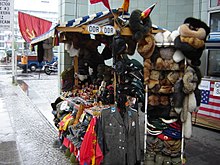


In German culture, Ostalgie (German: [ˌʔɔstalˈɡiː] ) is nostalgia for aspects of life in Communist East Germany. It is a portmanteau of the German words Ost (east) and Nostalgie (nostalgia). Its anglicised equivalent, ostalgia (rhyming with "nostalgia"), is also sometimes used. Another term for the phenomenon is GDR nostalgia (‹See Tfd›German: DDR-Nostalgie).
The term was coined by the East German standup comic Uwe Steimle in 1992.[1] Social scientist Thomas Ahbe argues that the term "ostalgia" is often misunderstood as a lack of willingness to integrate, an attempt to reverse German reunification and reinstate the GDR.[2] However, Ostalgia is rather an integration strategy used by East Germans who wanted to retain their own original experiences, memories and values incompatible with those of the West German majority.[3]
As with other cases of Communist nostalgia, there are various motivations, whether ideology, nationalism, wistfulness for a lost sense of social status or stability, or even aesthetics or irony.
In 2023, a poll found that while 52% of Germans living in the former East Germany identified as Germans, 40% identify as East Germans.[4][5]
- ^ "Ostalgiker Uwe Steimle bezeichnet sich als Kleinbürger". Hannoversche Allgemeine Zeitung (in German). 12 October 2012. Archived from the original on 10 October 2013. Retrieved 16 January 2016.
- ^ Ahbe, Thomas (2005). Ostalgie: zum Umgang mit der DDR-Vergangenheit in den 1990er Jahren (PDF) (in German). Landeszentrale für Politische Bildung Thüringen. p. 66. ISBN 978-3-931426-96-5.
- ^ Varvantakis, Christos (January 2009). "A monument to dismantlement" (PDF). Memory Studies. 2 (1): 27–38. doi:10.1177/1750698008097393. ISSN 1750-6980. S2CID 144579488.
- ^ "33 Jahre Wiedervereinigung".
- ^ Hoyer, Katja (7 March 2024). "What's 'wrong' with east Germany? Look to its long neglect by the wealthy west". The Guardian.